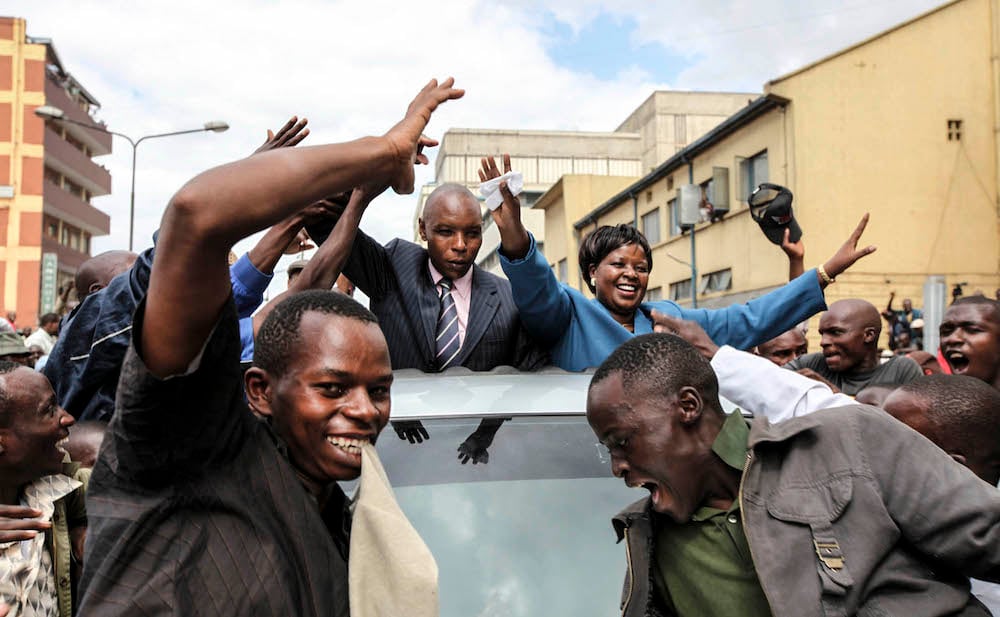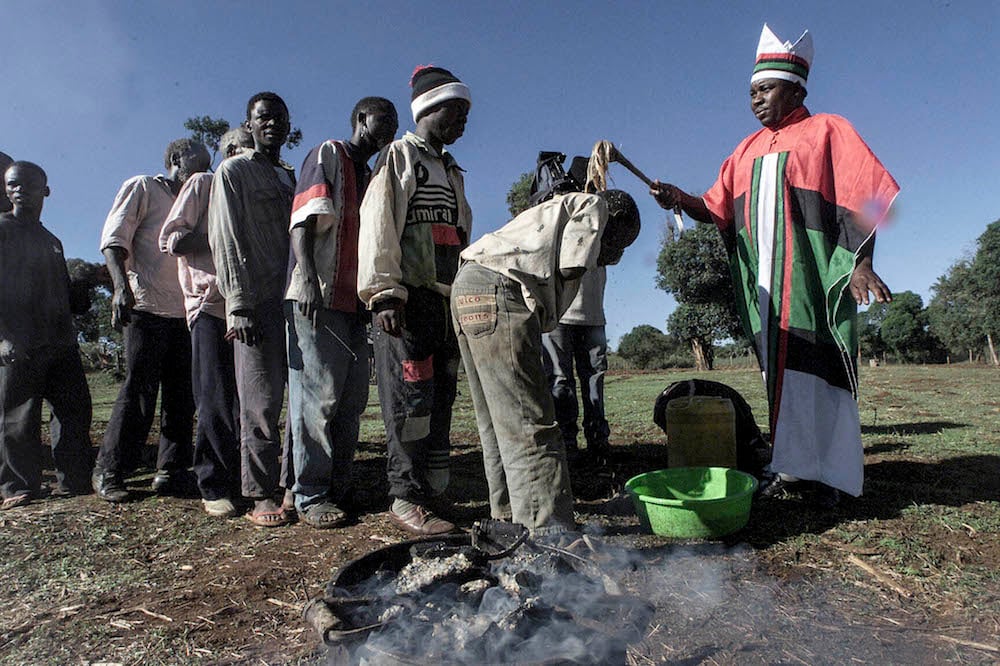Slum dwellers carry the body of a suspected Mungiki gang member in June 2007 in Nairobi's Mathare slum
“Ni ciakwa [They are mine].”
Those are the two important Kikuyu words that saved Michael Omondi’s house from being razed by the dreaded Mungiki, an outlawed religious Kikuyu sect, at the height of Kenya’s post-election violence in 2007.
Omondi had learned the two words from his Kikuyu friend, Maureen Nyarwai, who had often said them to matatu (minibus taxi) operators when asked about the vegetables she had in her sack after tilling her farm.
A terrified Omondi watched as the gang, armed with machetes, broke down the doors of his neighbours, forced people out, demanded their identity cards and forcefully circumcised all who were not Kikuyus.
“Anyone who resisted had his head chopped off while his family watched in horror. I prayed that they would not ask me to say anything else in the language, as those were the only two words I knew,” said Omondi during an interview in Nakuru, north of Nairobi.
The sect, which was banned in 2003, was on a revenge mission after war broke out in the Rift Valley following the disputed 2007 elections. Ethnic Kalenjins had turned against the Kikuyus living in the Rift, forcing them to turn against anyone who was not from their tribes.
By the end of the conflict, at least 1 300 Kenyans had died, with 650 000 displaced by violence. According to the Waki report, which was tasked with investigating the 2007-2008 bloodbath, the Mungiki sect was deeply involved in the massacre.
President Uhuru Kenyatta was accused by the International Criminal Court of financing Mungiki’s retaliatory attacks. But, the court has since dropped the charges.
With a membership estimated at more than 500 000, Mungiki has since re-emerged stronger – and with more financial muscle.
The cult – whose leader, Maina Njenga, left to become a pastor – advocates female genital mutilation. They have also been known to strip women who wear trousers. They disapprove of modern lifestyles.
With a year to go until Kenya’s next elections, security organs have expressed fears over the re-emergence of the sect in the form of gangs operating in some of the country’s major centres.
Mungiki is said to have been behind the death of 50 people in 2002 in incidents involving matatu owners in Nairobi. In February 2003, a clash between the sect and Nairobi police left two officers dead and 74 of the group’s members in police custody.
In June 2007, they allegedly embarked on a killing spree, beheading matatu drivers, conductors and Mungiki defectors, and those who refused to take their oath. In response, armed security forces stormed the Mathare slums where the sect was operating from, leading to the deaths of at least 100 people.
In April 2009, the group was implicated in hacking to death 28 people in a revenge mission in Gathaithi, in the central city of Nyeri.

John Maina Njenga, leader of the Mungiki sect, waves to his supporters in Nairobi in 2009, accompanied by bishop Margaret Wanjiru of Jesus is Alive Ministries church. (Thomas Mukoya/Reuters)
Initially confined to operating in the shoe-shine and hawking industry, Mungiki gang members are now said to be in charge of major markets, including Nasher square, one of the biggest in Nakuru county.
Kenya’s inspector general of police has issued an alert about a plot to reinvigorate the criminal gangs ahead of the 2017 elections.
“The national police service is aware of the plans to revive over 50 outlawed groups, including Mungiki, in the country, but as the police we will not let them flourish,” said Joseph Boinnet.
Prominent politicians and high-ranking professionals are being linked to the illegal sect. In January, Nakuru governor Kinuthia Mbugua caused a stir when he attended the burial of one of Mungiki’s most notorious leaders, Joseph Ngugi Chege, who was killed by unknown assailants.
Although he has repeatedly denied any link to the outlawed group, Kinuthia maintains that Chege was “a close friend” and a business associate with whom he had transacted many deals.
It is the nature of these deals that is now being called into question, with Nakuru Street Traders and Hawkers Association chairperson Simon Ole Nasieku petitioning Kenya’s National Assembly to investigate. He accused Kinuthia of using Mungiki members to harass hawkers when they were relocated from the town’s centre in 2015.
Ben Gathogo, who chairs one of Nakuru’s matatu associations, was one of Kinuthia’s key campaigners in 2013 and claims that Kinuthia used cult members as security personnel. This is despite him being given seven armed police officers for his personal security for life after he retired as head of the Administration Police.
Gathogo estimates that the group collects at least $8 000 countrywide every day from matatu operators in return for being allowed to operate.
In their bid to control the markets in Nakuru, Mungiki gangs allegedly demand at least $3 000 from hawkers in return for a space. “Many women who could not afford to give the cash ended up being forced to give sexual favours so that they could get an operating zone,” Gathogo added.
He claims that local politicians are trying to woo Mungiki to their side: “Politicians will be tempted to use organised groups, and the Mungiki is one of their favourites. In Nakuru alone, they are about 100 000 [in number] and usually approach politicians, seeking to impress them with their numbers.
In Nyeri, county commissioner Onesmus Musyoki said the illegal group had begun extorting money in three major matatu terminuses.

Members of the outlawed Mungiki sect line up in front of a high priest to receive special cleansing in the Ng’arua region in Kenya’s Rift Valley, in 2002. (George Mulala/Reuters)
MP Kimani Ichung’wah has also filed a petition to the National Assembly to have Kiambu governor William Kabogo investigated for alleged links with the militia. He accused the governor of not only backing the sect but also of managing and funding its operations at the county government’s expense.
Kigumo MP Jamleck Kamau said a similar gang exists in Murang’a county and was responsible for harassing officials from the Ethics and Anti-Corruption Commission who had gone to the premises of governor Mwangi wa Iria to investigate claims of corruption.
Jude Njomo, the MP for Kiambu Town, said the gang had followed MPs and their supporters to Mombasa recently when they went to support Waime Kamau, a popular blogger, during his court case. “They are in control and if you don’t have a gun, you cannot get your way,” said Njomo.
Nakuru East MP David Gikaria, who claims to have been physically assaulted on six occasions by sect members, has accused the police of being lax when it comes to dealing with Mungiki members. “Personally, I have reported six times to the police after they assaulted me and harassed me physically, but no action has been taken against any of their members. The police are reluctant to deal with the group as they also fear for their lives,” said Gikaria.
Gikaria, who is the former Nakuru mayor, said the Flamingo area lost 36 people to the gang in 2003. Alleging an increase in attacks by the group, he related how he was addressing the issue of school land that had been “grabbed” when gang members descended on the venue.
“[The fact that] they were hired for security to protect the land is a clear indication that they run the entire security system. I have also written to the inspector of police, seeking help in eradicating them, but they have not been helpful,” he added.